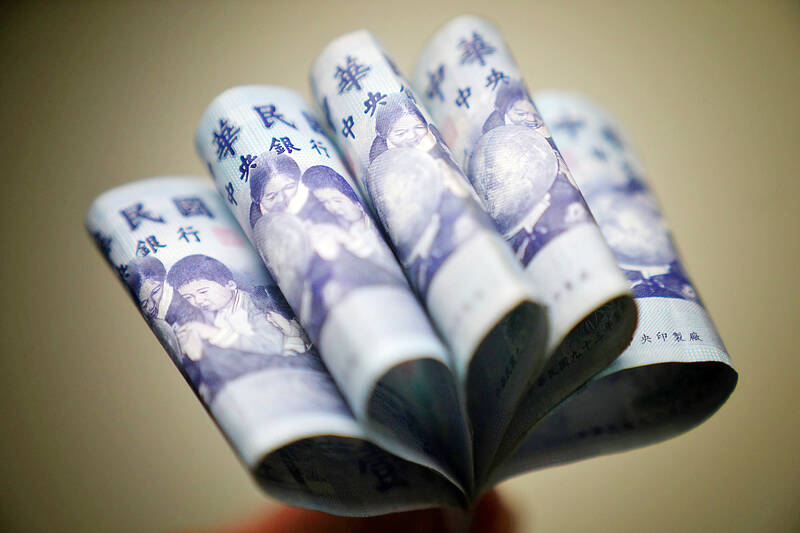Taiwan’s money supply, measured by M1B and M2 movements, posted mild growth last month, the latest central bank data released on Thursday showed.
The M1B — a narrow measure of money in circulation — rose 4.07 percent last month from a year ago, compared with August’s 4.05 percent increase, the central bank said in a report, attributing the improvement to rising demand deposits.
In the first nine months of this year, M1B rose 4.66 percent, it said.

Photo: CNA
The annual growth of the broader M2 money supply — which includes M1B, time deposits, time savings deposits, foreign currency deposits and mutual funds — was 5.6 percent last month, down from the 5.8 percent recorded in August, the central bank said.
The annual growth of M2 had decelerated for the third consecutive month last month due to continued capital outflows, it said.
However, the average annual growth of M2 in the first nine months was 5.9 percent, within the central bank’s target range of 2.5 percent to 6.5 percent. This indicates that the liquidity level in the market is still abundant, which is beneficial to consumption, the stock market and other investment activities, the central bank said.
That was evidenced by the continued growth in bank loans and investments, with the annual growth of lending and investment by all monetary institutions accelerating for the sixth straight month, up from 8.4 percent in August to 8.85 percent last month, central bank data showed.
Meanwhile, the securities account balance, a major confidence gauge of the local stock market by retail investors, fell NT$5.3 billion (US$165.3 million) to NT$3.49 trillion last month, while the balance of margin loans increased NT$12.3 billion to NT$427.3 billion, the central bank said.
The central bank said the securities account balance last month decreased slightly from the previous month as the TAIEX underwent a consolidation, but the figure still marked the fifth-highest level on record. In addition, the balance of margin loans rebounded last month and represented the third-highest level since May 2008, it said.
Both figures reflected that retail investors’ willingness to invest in the stock market is still positive, which is conducive to the trading of Taiwanese stocks going forward, it added.
The TAIEX on Friday closed at 23,348.45 points, up 0.67 percent from the previous session. It has risen 30.21 percent so far this year, with a daily average turnover of NT$422.43 billion on the main board, Taiwan Stock Exchange data showed.

SEEKING CLARITY: Washington should not adopt measures that create uncertainties for ‘existing semiconductor investments,’ TSMC said referring to its US$165 billion in the US Taiwan Semiconductor Manufacturing Co (TSMC, 台積電) told the US that any future tariffs on Taiwanese semiconductors could reduce demand for chips and derail its pledge to increase its investment in Arizona. “New import restrictions could jeopardize current US leadership in the competitive technology industry and create uncertainties for many committed semiconductor capital projects in the US, including TSMC Arizona’s significant investment plan in Phoenix,” the chipmaker wrote in a letter to the US Department of Commerce. TSMC issued the warning in response to a solicitation for comments by the department on a possible tariff on semiconductor imports by US President Donald Trump’s

The government has launched a three-pronged strategy to attract local and international talent, aiming to position Taiwan as a new global hub following Nvidia Corp’s announcement that it has chosen Taipei as the site of its Taiwan headquarters. Nvidia cofounder and CEO Jensen Huang (黃仁勳) on Monday last week announced during his keynote speech at the Computex trade show in Taipei that the Nvidia Constellation, the company’s planned Taiwan headquarters, would be located in the Beitou-Shilin Technology Park (北投士林科技園區) in Taipei. Huang’s decision to establish a base in Taiwan is “primarily due to Taiwan’s talent pool and its strength in the semiconductor

An earnings report from semiconductor giant and artificial intelligence (AI) bellwether Nvidia Corp takes center stage for Wall Street this week, as stocks hit a speed bump of worries over US federal deficits driving up Treasury yields. US equities pulled back last week after a torrid rally, as investors turned their attention to tax and spending legislation poised to swell the US government’s US$36 trillion in debt. Long-dated US Treasury yields rose amid the fiscal worries, with the 30-year yield topping 5 percent and hitting its highest level since late 2023. Stocks were dealt another blow on Friday when US President Donald

UNCERTAINTY: Investors remain worried that trade negotiations with Washington could go poorly, given Trump’s inconsistency on tariffs in his second term, experts said The consumer confidence index this month fell for a ninth consecutive month to its lowest level in 13 months, as global trade uncertainties and tariff risks cloud Taiwan’s economic outlook, a survey released yesterday by National Central University found. The biggest decline came from the timing for stock investments, which plunged 11.82 points to 26.82, underscoring bleak investor confidence, it said. “Although the TAIEX reclaimed the 21,000-point mark after the US and China agreed to bury the hatchet for 90 days, investors remain worried that the situation would turn sour later,” said Dachrahn Wu (吳大任), director of the university’s Research Center for